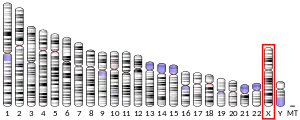| SSX2B | |||||||||||||||||||||||||||||||||||||||||||||||||||
|---|---|---|---|---|---|---|---|---|---|---|---|---|---|---|---|---|---|---|---|---|---|---|---|---|---|---|---|---|---|---|---|---|---|---|---|---|---|---|---|---|---|---|---|---|---|---|---|---|---|---|---|
| Identifiers | |||||||||||||||||||||||||||||||||||||||||||||||||||
| Aliases | SSX2B, CT5.2, CT5.2b, HOM-MEL-40, SSX, synovial sarcoma, X breakpoint 2B, SSX family member 2B | ||||||||||||||||||||||||||||||||||||||||||||||||||
| External IDs | HomoloGene: 133226 GeneCards: SSX2B | ||||||||||||||||||||||||||||||||||||||||||||||||||
| |||||||||||||||||||||||||||||||||||||||||||||||||||
| |||||||||||||||||||||||||||||||||||||||||||||||||||
| |||||||||||||||||||||||||||||||||||||||||||||||||||
| |||||||||||||||||||||||||||||||||||||||||||||||||||
| Wikidata | |||||||||||||||||||||||||||||||||||||||||||||||||||
| |||||||||||||||||||||||||||||||||||||||||||||||||||
Protein SSX2 is a protein that in humans is encoded by the SSX2 gene.[3][4]
The product of this gene belongs to the family of highly homologous synovial sarcoma, X (SSX) breakpoint proteins. These proteins may function as transcriptional repressors. They are also capable of eliciting spontaneously humoral and cellular immune responses in cancer patients, and are potentially useful targets in cancer vaccine-based immunotherapy. SSX1, SSX2 and SSX4 genes have been involved in the t(X;18) chromosomal translocation characteristically found in all synovial sarcomas. This translocation results in the fusion of the synovial sarcoma translocation gene on chromosome 18 to one of the SSX genes on chromosome X. The encoded hybrid proteins are probably responsible for transforming activity. Two transcript variants encoding distinct isoforms have been identified for this gene.[4]
References
- 1 2 3 GRCh38: Ensembl release 89: ENSG00000268447 - Ensembl, May 2017
- ↑ "Human PubMed Reference:". National Center for Biotechnology Information, U.S. National Library of Medicine.
- ↑ Tureci O, Sahin U, Schobert I, Koslowski M, Scmitt H, Schild HJ, Stenner F, Seitz G, Rammensee HG, Pfreundschuh M (Nov 1996). "The SSX-2 gene, which is involved in the t(X;18) translocation of synovial sarcomas, codes for the human tumor antigen HOM-MEL-40". Cancer Res. 56 (20): 4766–72. PMID 8840996.
- 1 2 "Entrez Gene: SSX2 synovial sarcoma, X breakpoint 2".
Further reading
- Wu LQ, Lu Y, Wang XF, et al. (2006). "Expression of cancer-testis antigen (CTA) in tumor tissues and peripheral blood of Chinese patients with hepatocellular carcinoma". Life Sci. 79 (8): 744–8. doi:10.1016/j.lfs.2006.02.024. PMID 16546222.
- Mehrle A, Rosenfelder H, Schupp I, et al. (2006). "The LIFEdb database in 2006". Nucleic Acids Res. 34 (Database issue): D415–8. doi:10.1093/nar/gkj139. PMC 1347501. PMID 16381901.
- Rual JF, Venkatesan K, Hao T, et al. (2005). "Towards a proteome-scale map of the human protein-protein interaction network". Nature. 437 (7062): 1173–8. Bibcode:2005Natur.437.1173R. doi:10.1038/nature04209. PMID 16189514. S2CID 4427026.
- Fernebro J, Francis P, Edén P, et al. (2006). "Gene expression profiles relate to SS18/SSX fusion type in synovial sarcoma". Int. J. Cancer. 118 (5): 1165–72. doi:10.1002/ijc.21475. PMID 16152617.
- Ross MT, Grafham DV, Coffey AJ, et al. (2005). "The DNA sequence of the human X chromosome". Nature. 434 (7031): 325–37. Bibcode:2005Natur.434..325R. doi:10.1038/nature03440. PMC 2665286. PMID 15772651.
- Tvrdík D, Povýsil C, Svatosová J, Dundr P (2005). "Molecular diagnosis of synovial sarcoma: RT-PCR detection of SYT-SSX1/2 fusion transcripts in paraffin-embedded tissue". Med. Sci. Monit. 11 (3): MT1–7. PMID 15735574.
- Ayyoub M, Merlo A, Hesdorffer CS, et al. (2005). "Distinct but overlapping T helper epitopes in the 37-58 region of SSX-2". Clin. Immunol. 114 (1): 70–8. doi:10.1016/j.clim.2004.08.014. PMID 15596411.
- Wiemann S, Arlt D, Huber W, et al. (2004). "From ORFeome to biology: a functional genomics pipeline". Genome Res. 14 (10B): 2136–44. doi:10.1101/gr.2576704. PMC 528930. PMID 15489336.
- Gerhard DS, Wagner L, Feingold EA, et al. (2004). "The status, quality, and expansion of the NIH full-length cDNA project: the Mammalian Gene Collection (MGC)". Genome Res. 14 (10B): 2121–7. doi:10.1101/gr.2596504. PMC 528928. PMID 15489334.
- Strausberg RL, Feingold EA, Grouse LH, et al. (2003). "Generation and initial analysis of more than 15,000 full-length human and mouse cDNA sequences". Proc. Natl. Acad. Sci. U.S.A. 99 (26): 16899–903. Bibcode:2002PNAS...9916899M. doi:10.1073/pnas.242603899. PMC 139241. PMID 12477932.
- Güre AO, Wei IJ, Old LJ, Chen YT (2002). "The SSX gene family: characterization of 9 complete genes". Int. J. Cancer. 101 (5): 448–53. doi:10.1002/ijc.10634. PMID 12216073. S2CID 21174312.
- Yang K, Lui WO, Xie Y, et al. (2002). "Co-existence of SYT-SSX1 and SYT-SSX2 fusions in synovial sarcomas". Oncogene. 21 (26): 4181–90. doi:10.1038/sj.onc.1205569. PMID 12037676. S2CID 33515965.
- de Bruijn DR, dos Santos NR, Kater-Baats E, et al. (2002). "The cancer-related protein SSX2 interacts with the human homologue of a Ras-like GTPase interactor, RAB3IP, and a novel nuclear protein, SSX2IP". Genes Chromosomes Cancer. 34 (3): 285–98. doi:10.1002/gcc.10073. PMID 12007189. S2CID 11734893.
- Brodin B, Haslam K, Yang K, et al. (2001). "Cloning and characterization of spliced fusion transcript variants of synovial sarcoma: SYT/SSX4, SYT/SSX4v, and SYT/SSX2v. Possible regulatory role of the fusion gene product in wild type SYT expression". Gene. 268 (1–2): 173–82. doi:10.1016/S0378-1119(01)00412-7. PMID 11368913.
- Simpson JC, Wellenreuther R, Poustka A, et al. (2001). "Systematic subcellular localization of novel proteins identified by large-scale cDNA sequencing". EMBO Rep. 1 (3): 287–92. doi:10.1093/embo-reports/kvd058. PMC 1083732. PMID 11256614.
- Hartley JL, Temple GF, Brasch MA (2001). "DNA cloning using in vitro site-specific recombination". Genome Res. 10 (11): 1788–95. doi:10.1101/gr.143000. PMC 310948. PMID 11076863.
- dos Santos NR, Torensma R, de Vries TJ, et al. (2000). "Heterogeneous expression of the SSX cancer/testis antigens in human melanoma lesions and cell lines". Cancer Res. 60 (6): 1654–62. PMID 10749136.
- dos Santos NR, de Bruijn DR, Balemans M, et al. (1998). "Nuclear localization of SYT, SSX and the synovial sarcoma-associated SYT-SSX fusion proteins". Hum. Mol. Genet. 6 (9): 1549–58. doi:10.1093/hmg/6.9.1549. PMID 9285793.
- Shipley JM, Clark J, Crew AJ, et al. (1994). "The t(X;18)(p11.2;q11.2) translocation found in human synovial sarcomas involves two distinct loci on the X chromosome". Oncogene. 9 (5): 1447–53. PMID 8152806.

